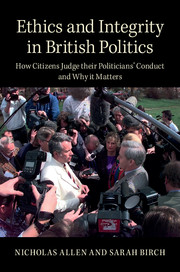 Ethics and Integrity in British Politics
Ethics and Integrity in British Politics Book contents
- Frontmatter
- Dedication
- Contents
- List of Figures
- List of Tables
- Preface and acknowledgements
- 1 Why study perceptions of politicians’ conduct?
- 2 Thinking about political ethics and conduct
- 3 Ethics and misconduct in British politics
- 4 Expectations and the scope of ethical judgements
- 5 How people judge political conduct
- 6 What people think of their elected politicians
- 7 The political effects of ethical evaluations
- 8 Changing public perceptions: problems and remedies
- 9 Concluding remarks
- Appendix: data and variable construction
- References
- Index
9 - Concluding remarks
Published online by Cambridge University Press: 05 February 2015
- Frontmatter
- Dedication
- Contents
- List of Figures
- List of Tables
- Preface and acknowledgements
- 1 Why study perceptions of politicians’ conduct?
- 2 Thinking about political ethics and conduct
- 3 Ethics and misconduct in British politics
- 4 Expectations and the scope of ethical judgements
- 5 How people judge political conduct
- 6 What people think of their elected politicians
- 7 The political effects of ethical evaluations
- 8 Changing public perceptions: problems and remedies
- 9 Concluding remarks
- Appendix: data and variable construction
- References
- Index
Summary
I think that people who run for office initially have good intentions, but they somehow change when they get into the system.
(Female focus group participant, Colchester)Long before he championed passage of the Thirteenth Amendment, long before he delivered his address at Gettysburg, and long before he was elected President of the United States, a young Illinois state legislator, Abraham Lincoln, remarked: ‘Politicians are a set of men who have interests aside from the interests of the people and who, to say the most of them, are, taken as a mass, at least one long step removed from honest men’ (Basler et al. 1953: 65–6). Nine-score and eight years have elapsed since Lincoln made these remarks, but his words, and the sentiment they convey, paint an unnervingly accurate picture of how politics and political conduct is perceived in Britain and most other liberal democracies today. Politicians are generally not trusted. Politicians are generally not liked.
In truth, of course, the moral standing of British politicians in the eyes of the public is not so far removed from the moral standing of politicians in the United States, in France, in Germany or in a host of other established liberal democracies. Politics as a profession always elicits some measure of scepticism, if not cynicism, in the public mind, and it often does so for good and democratically healthy reasons. Yet there also comes a point when the scale of scepticism and cynicism becomes unhealthy for democracy. There is no absolute agreement that this point has been reached in Britain, but there is widespread agreement that public confidence in British political institutions and processes has been eroding in recent years and, moreover, that negative perceptions of politicians’ honesty and integrity have been part and parcel of this erosion. Furthermore, there is evidence that this erosion of confidence in Britain has been especially marked in comparison with changes in levels of support in a number of other Western European democracies (Norris 2011).
- Type
- Chapter
- Information
- Ethics and Integrity in British PoliticsHow Citizens Judge their Politicians' Conduct and Why it Matters, pp. 205 - 209Publisher: Cambridge University PressPrint publication year: 2015


